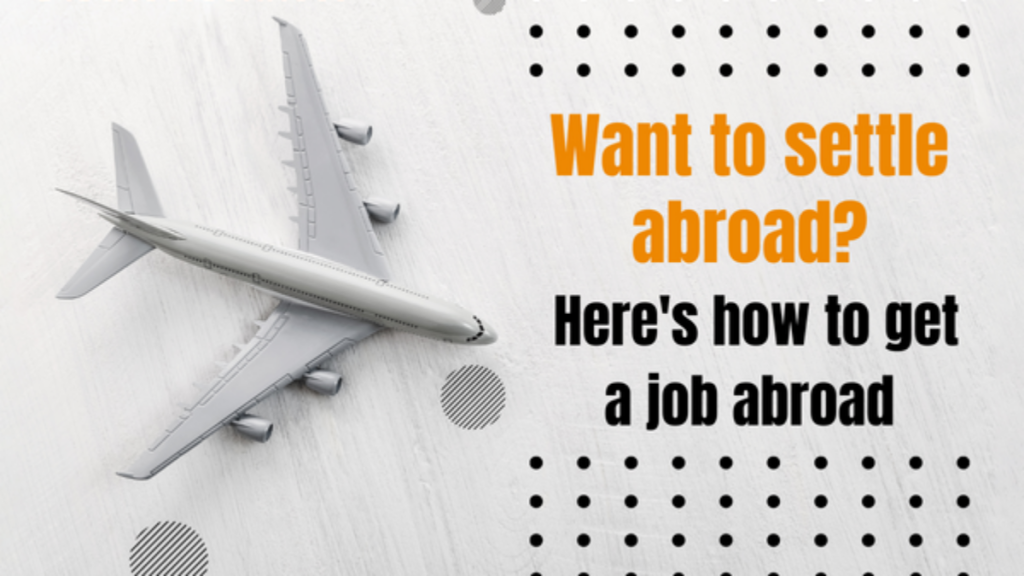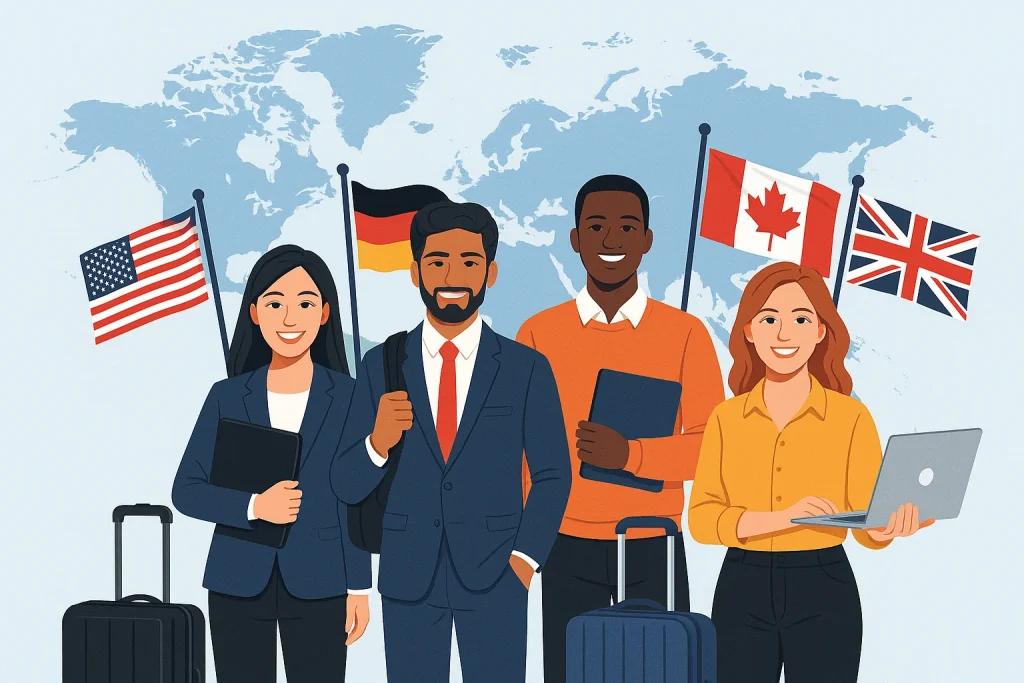How to Travel and Secure a Job Abroad: The Ultimate 2026 Guide
Traveling abroad is a dream for many, but what if you could combine adventure with career growth? The good news is that in 2026, more opportunities than ever exist for globetrotters to not only explore new countries but also work and earn while abroad. This guide will take you step by step through how to travel and secure a job abroad, covering everything from planning, applications, visas, and cultural adaptation to practical tips and technology-driven strategies.

1. Why Work Abroad Is a Life-Changing Experience
Working abroad goes beyond earning a paycheck. It transforms your personal and professional life in ways that are impossible through domestic work alone.
Benefits Include:
- Professional growth: Gain global experience that sets your CV apart.
- Cultural exposure: Learn new languages, traditions, and ways of working.
- Networking: Build international connections that can open doors worldwide.
- Financial opportunity: Depending on the country, your income can stretch further due to favorable exchange rates or lower living costs.
Understanding these benefits helps motivate you to pursue your journey strategically.
2. Choosing the Right Destination
Before asking how to travel and secure a job abroad, you need to identify the ideal country for your goals. Consider:
a. Work Opportunities
- Look for industries with high demand for foreign professionals. For example: IT, healthcare, teaching English, engineering, and hospitality.
- Check local job boards, international recruitment agencies, and LinkedIn for openings.
b. Visa Regulations
- Some countries offer work permits, working holiday visas, or freelance/remote work visas.
- Research eligibility requirements, duration, and renewal options.
c. Cost of Living and Lifestyle
- Factor in housing, transportation, and daily expenses.
- Consider lifestyle preferences, climate, and language barriers.
d. Cultural and Language Fit
- Learning the local language may be essential. Some countries require proficiency for professional roles.
- Understanding workplace culture ensures smoother integration.
3. Preparing Your CV and Online Profile
Employers abroad often value a polished, professional profile.
a. CV/Resume Tips
- Tailor your CV to international standards; for instance, U.S. resumes are concise and skills-focused, while European CVs often include detailed experience.
- Highlight transferable skills, achievements, and international experience.
- Include certifications or language proficiency relevant to the country.
b. Online Presence
- Update LinkedIn and other professional networks. International recruiters often search for talent online first.
- Share relevant projects, volunteer experience, or portfolios.
- Join expat and job-seeker groups to network with like-minded professionals.
4. Finding Jobs Abroad
There are several ways to secure employment while traveling abroad:
a. Job Boards and Recruitment Agencies
- Websites like Indeed, Glassdoor, and LinkedIn have international filters.
- Specialized platforms like Workaway, GoAbroad, and TEFL-focused boards are ideal for teaching positions.
b. Networking
- Personal referrals are highly valued internationally.
- Attend industry-specific webinars, online meetups, and professional events to connect with employers.
c. Freelance and Remote Work
- Remote work allows you to earn while traveling without strict visa requirements.
- Platforms like Upwork, Fiverr, and Toptal offer opportunities across multiple industries.
5. Understanding Visa and Work Permit Requirements
Visas are the most crucial step in the journey of how to travel and secure a job abroad.
a. Common Visa Types
- Working Holiday Visa: Ideal for young travelers looking for short-term work and travel.
- Work Visa/Permit: Requires an employer sponsorship; often industry-specific.
- Student Visa: Can sometimes allow part-time work while studying abroad.
- Digital Nomad/Remote Work Visa: New trend for professionals who work online.
b. Application Tips
- Prepare documents like CV, reference letters, educational certificates, and proof of funds.
- Understand processing times; apply months in advance.
- Some countries now allow fully online applications.

6. Budgeting and Financial Planning
Traveling and working abroad requires smart financial planning:
a. Initial Expenses
- Flights, visa fees, insurance, housing deposits, and transportation.
- Set aside at least 3–6 months of living expenses in case of delayed employment.
b. Managing Income Abroad
- Open a local bank account if permitted.
- Use international money transfer apps to save on fees.
- Keep a budget for living costs, entertainment, and travel.
c. Taxes
- Research local taxation laws; some countries have agreements to avoid double taxation.
- Remote workers may have to pay taxes in their home country.
7. Preparing for Cultural and Workplace Adaptation
Landing a job abroad is only part of the journey. Adapting to a new culture is equally crucial:
a. Workplace Culture
- Research norms: punctuality, communication style, and hierarchy.
- Ask colleagues about local practices; subtle etiquette differences can matter.
b. Social Integration
- Learn basic language phrases.
- Attend community events or join expat clubs to meet people.
- Be patient; cultural adaptation takes time.
8. Practical Travel Tips While Working Abroad
Maintaining balance between travel and work is essential:
- Accommodation: Consider short-term rentals, shared apartments, or hostels initially.
- Transportation: Use local transport passes, e-bikes, or walking for short commutes.
- Connectivity: Invest in reliable mobile internet and VPNs if working remotely.
- Health and Safety: Get insurance that covers both health and emergencies abroad.
9. Leveraging Technology in 2026
Technology in 2026 makes working abroad more efficient than ever:
- AI Job Match Platforms: Recommend roles based on skills, experience, and location.
- Virtual Interviews: Save time and money by interviewing remotely.
- Language Learning Apps: Rapidly learn essential phrases before arriving.
- Finance Apps: Manage multiple currencies, transfers, and budgeting seamlessly.
10. Long-Term Career Growth
Working abroad can shape your future in significant ways:
- Resume Impact: International experience stands out to future employers.
- Networking: Connections abroad can lead to global career opportunities.
- Skill Development: Problem-solving, adaptability, and cross-cultural communication improve dramatically.
- Potential Permanent Residency: Some countries allow long-term residency for skilled workers.

11. Common Mistakes to Avoid
- Not researching visa and work requirements thoroughly.
- Arriving without a financial buffer.
- Ignoring cultural norms or workplace etiquette.
- Overcommitting to travel and underperforming at work.
- Neglecting health insurance or emergency planning.
12. Final Thoughts
Learning how to travel and secure a job abroad is a journey of preparation, persistence, and adaptability. With the right strategy, you can combine the thrill of exploration with professional growth. By researching destinations, optimizing your CV, networking, understanding visa requirements, budgeting wisely, and embracing cultural adaptation, your overseas adventure can be both financially rewarding and personally transformative.
Traveling and working abroad isn’t just about earning money—it’s about gaining experiences, growing professionally, and creating memories that last a lifetime.